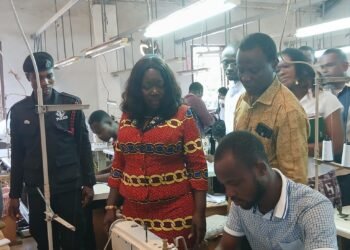Senior Advisor at the National AfCFTA Coordinating Office, Dr Ato Panford, has expressed the need for Small Medium Enterprises (SMEs) to be given ample sensitization and information regarding trading under AfCFTA.
According to him, information is crucial for businesses to help facilitate their entry into the AfCFTA market. He revealed that one of the key things businesses require is “direct intervention”, which the NCO has considered in its framework to support SMEs aside the relevance of access to finance.
“We should also not forget that companies under the 1D1F have also almost about 10% waiver which the government through the ministries are taking care of. So, these are the things; what we need to try and drive down is that, access to information is key for our SMEs to know where the opportunities lie.”
Dr Ato Panford
Speaking at CUTS International’s roundtable discussion on ‘AfCFTA: The role of the private sector’, Dr Panford stated that access to funding is an important feature for SMEs. As such, the NCO has brought on board some of the banks together as participating financial institutions.
Dr Panford emphasized that banks together with the NCO will support the private sector SMEs who are ready to engage in AfCFTA.
Commenting on the relevance of the national coordinating office on businesses, Dr Panford explained that research findings revealed that the most common challenge that confronts businesses is “access to credit or finance”. He noted that these two factors are key when conversations on funding comes up.
“If it comes to CAPEX issue, the cost of the capital injection is also very important to see how best we frame it up. From the findings that we have all observed, it looks like the SMEs are challenged in retooling and also funding their export activities, access to consistent raw material, etc. All these are some of the challenges that they face; but then we ask ourselves, how we can support them?”
Dr Ato Panford
Challenges of businesses with AfCFTA
Dr Panford highlighted that because the assignment of the NCO is to engage individual SMEs and have dialogues with them, the issues vary from one SME to the other. However, he stated that there are “underlying cross-cutting challenges” every business identifies with.
On his part, the Head of Exports at the Ghana National Chamber of Commerce, Charles Arthur Ntiri, revealed that since January last year, his outfit has been working on how best it can support SMES to register their products and companies under AfCFTA. Nonetheless, he explained that the challenge the Chamber is facing stems from the Secretariat, as there are a lot of things they have not completed.
“They have to complete the rules of origin. Based on the rules of origin, that’s what we are going to use to register them and if we have not completed the rules, how are we going to register the companies? As at now, I think they’ve been able to complete about 88%. So still, we have a gap, but we have started registering them.”
Charles Arthur Ntiri
Mr Ntiri noted that the other problem has to do with sensitization of these companies. With this, he commended GIZ for supporting the Chamber over the last three months.
“… We’ve gone through all the sixteen regions to sensitize them so that they will be able to take advantage, they will be able to register under AfCFTA… All these things are delaying the process.”
Charles Arthur Ntiri
READ ALSO: Issue New Directives On Visa Approval Processes for Consular Officials in China- Ablakwa To Gov’t























